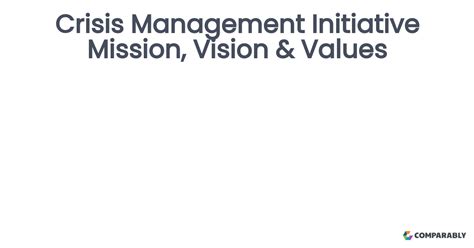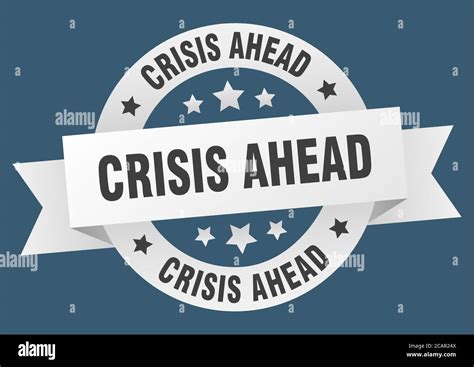Crisis Management Initiative: Stay Ahead of the Storm

Understanding the Importance of Crisis Management

In today’s fast-paced and interconnected world, crises can emerge from anywhere, at any time. Whether it’s a natural disaster, a cybersecurity breach, or a reputational crisis, being prepared is crucial for minimizing damage and ensuring business continuity. A well-planned crisis management initiative can help organizations stay ahead of the storm, protect their reputation, and maintain stakeholder trust.
Key Components of a Crisis Management Initiative

A comprehensive crisis management initiative should include the following key components:
- Crisis Management Team: Assemble a team of experts from various departments, including communications, operations, and executive management.
- Risk Assessment: Identify potential risks and threats to the organization, and assess their likelihood and potential impact.
- Crisis Management Plan: Develop a plan that outlines procedures for responding to crises, including communication protocols, emergency response procedures, and stakeholder management.
- Training and Exercises: Provide regular training and exercises to ensure that the crisis management team is prepared to respond effectively in the event of a crisis.
- Crisis Communication: Establish a communication strategy that includes messaging, media relations, and stakeholder engagement.
- Review and Revision: Regularly review and revise the crisis management plan to ensure that it remains relevant and effective.
Benefits of a Crisis Management Initiative

Implementing a crisis management initiative can bring numerous benefits to an organization, including:
- Reduced Risk: By identifying and mitigating potential risks, organizations can reduce the likelihood of a crisis occurring.
- Improved Response: A well-planned crisis management initiative ensures that organizations are prepared to respond quickly and effectively in the event of a crisis.
- Enhanced Reputation: By responding to crises in a timely and effective manner, organizations can protect their reputation and maintain stakeholder trust.
- Increased Resilience: A crisis management initiative can help organizations build resilience and adapt to changing circumstances.
- Cost Savings: By reducing the impact of a crisis, organizations can minimize costs associated with recovery and restoration.
Implementing a Crisis Management Initiative

Implementing a crisis management initiative requires careful planning and execution. The following steps can help organizations get started:
- Conduct a Risk Assessment: Identify potential risks and threats to the organization, and assess their likelihood and potential impact.
- Develop a Crisis Management Plan: Create a plan that outlines procedures for responding to crises, including communication protocols, emergency response procedures, and stakeholder management.
- Establish a Crisis Management Team: Assemble a team of experts from various departments, including communications, operations, and executive management.
- Provide Training and Exercises: Provide regular training and exercises to ensure that the crisis management team is prepared to respond effectively in the event of a crisis.
- Review and Revise the Plan: Regularly review and revise the crisis management plan to ensure that it remains relevant and effective.
Case Study: Effective Crisis Management in Action

In 2018, a major airline faced a crisis when one of its planes experienced a fatal accident. The airline’s crisis management team sprang into action, implementing its crisis management plan and communicating effectively with stakeholders. The team’s swift response helped to mitigate the damage to the airline’s reputation and ensured that stakeholders were informed and supported throughout the crisis.
| Component | Description |
|---|---|
| Crisis Management Team | Assemble a team of experts from various departments |
| Risk Assessment | Identify potential risks and threats to the organization |
| Crisis Management Plan | Develop a plan that outlines procedures for responding to crises |
| Training and Exercises | Provide regular training and exercises to ensure that the crisis management team is prepared |
| Crisis Communication | Establish a communication strategy that includes messaging, media relations, and stakeholder engagement |
| Review and Revision | Regularly review and revise the crisis management plan to ensure that it remains relevant and effective |

💡 Note: A crisis management initiative is not a one-time task, but rather an ongoing process that requires regular review and revision to ensure that it remains effective.
In conclusion, a crisis management initiative is essential for organizations to stay ahead of the storm and protect their reputation. By understanding the importance of crisis management, identifying key components, and implementing a crisis management initiative, organizations can reduce risk, improve response, and enhance their reputation.
What is a crisis management initiative?

+
A crisis management initiative is a comprehensive plan that outlines procedures for responding to crises, including communication protocols, emergency response procedures, and stakeholder management.
Why is a crisis management initiative important?

+
A crisis management initiative is important because it helps organizations reduce risk, improve response, and enhance their reputation in the event of a crisis.
How do I implement a crisis management initiative?

+
Implementing a crisis management initiative requires careful planning and execution. Start by conducting a risk assessment, developing a crisis management plan, establishing a crisis management team, providing training and exercises, and reviewing and revising the plan regularly.



